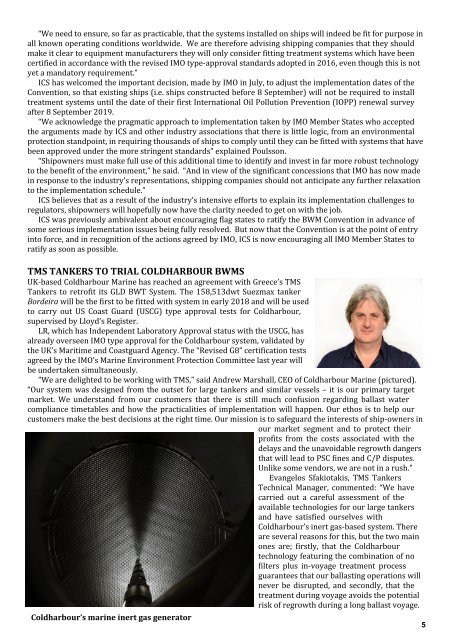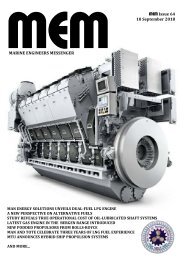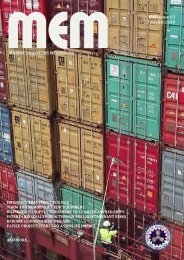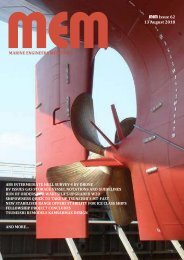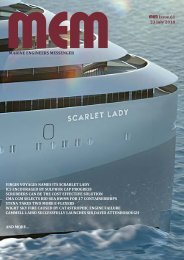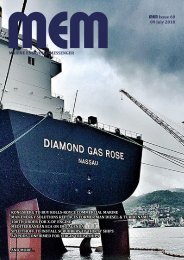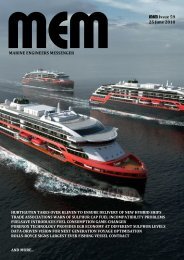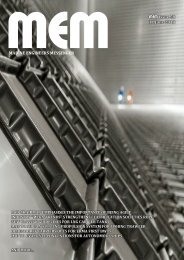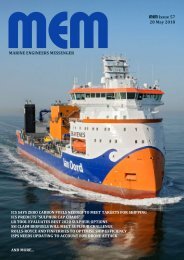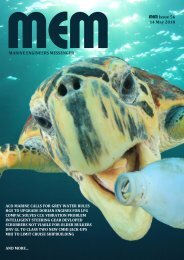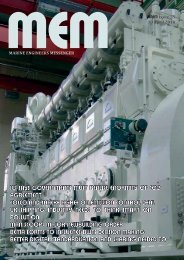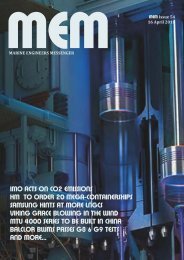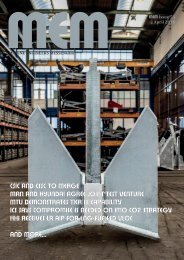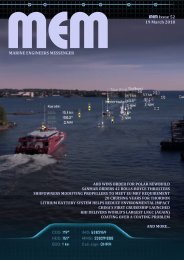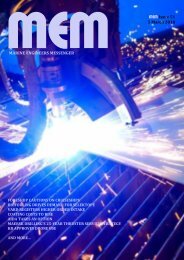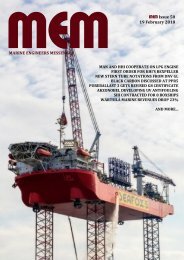MEM39
Marine Engineers Messenger, Volume 2, Issue 39
Marine Engineers Messenger, Volume 2, Issue 39
You also want an ePaper? Increase the reach of your titles
YUMPU automatically turns print PDFs into web optimized ePapers that Google loves.
“We need to ensure, so far as practicable, that the systems installed on ships will indeed be fit for purpose in<br />
all known operating conditions worldwide. We are therefore advising shipping companies that they should<br />
make it clear to equipment manufacturers they will only consider fitting treatment systems which have been<br />
certified in accordance with the revised IMO type-approval standards adopted in 2016, even though this is not<br />
yet a mandatory requirement.”<br />
ICS has welcomed the important decision, made by IMO in July, to adjust the implementation dates of the<br />
Convention, so that existing ships (i.e. ships constructed before 8 September) will not be required to install<br />
treatment systems until the date of their first International Oil Pollution Prevention (IOPP) renewal survey<br />
after 8 September 2019.<br />
“We acknowledge the pragmatic approach to implementation taken by IMO Member States who accepted<br />
the arguments made by ICS and other industry associations that there is little logic, from an environmental<br />
protection standpoint, in requiring thousands of ships to comply until they can be fitted with systems that have<br />
been approved under the more stringent standards” explained Poulsson.<br />
“Shipowners must make full use of this additional time to identify and invest in far more robust technology<br />
to the benefit of the environment,” he said. “And in view of the significant concessions that IMO has now made<br />
in response to the industry’s representations, shipping companies should not anticipate any further relaxation<br />
to the implementation schedule.”<br />
ICS believes that as a result of the industry’s intensive efforts to explain its implementation challenges to<br />
regulators, shipowners will hopefully now have the clarity needed to get on with the job.<br />
ICS was previously ambivalent about encouraging flag states to ratify the BWM Convention in advance of<br />
some serious implementation issues being fully resolved. But now that the Convention is at the point of entry<br />
into force, and in recognition of the actions agreed by IMO, ICS is now encouraging all IMO Member States to<br />
ratify as soon as possible.<br />
TMS TANKERS TO TRIAL COLDHARBOUR BWMS<br />
UK-based Coldharbour Marine has reached an agreement with Greece’s TMS<br />
Tankers to retrofit its GLD BWT System. The 158,513dwt Suezmax tanker<br />
Bordeira will be the first to be fitted with system in early 2018 and will be used<br />
to carry out US Coast Guard (USCG) type approval tests for Coldharbour,<br />
supervised by Lloyd’s Register.<br />
LR, which has Independent Laboratory Approval status with the USCG, has<br />
already overseen IMO type approval for the Coldharbour system, validated by<br />
the UK’s Maritime and Coastguard Agency. The “Revised G8” certification tests<br />
agreed by the IMO’s Marine Environment Protection Committee last year will<br />
be undertaken simultaneously.<br />
“We are delighted to be working with TMS,” said Andrew Marshall, CEO of Coldharbour Marine (pictured).<br />
“Our system was designed from the outset for large tankers and similar vessels – it is our primary target<br />
market. We understand from our customers that there is still much confusion regarding ballast water<br />
compliance timetables and how the practicalities of implementation will happen. Our ethos is to help our<br />
customers make the best decisions at the right time. Our mission is to safeguard the interests of ship-owners in<br />
our market segment and to protect their<br />
profits from the costs associated with the<br />
delays and the unavoidable regrowth dangers<br />
that will lead to PSC fines and C/P disputes.<br />
Unlike some vendors, we are not in a rush.”<br />
Evangelos Sfakiotakis, TMS Tankers<br />
Technical Manager, commented: “We have<br />
carried out a careful assessment of the<br />
available technologies for our large tankers<br />
and have satisfied ourselves with<br />
Coldharbour’s inert gas-based system. There<br />
are several reasons for this, but the two main<br />
ones are; firstly, that the Coldharbour<br />
technology featuring the combination of no<br />
filters plus in-voyage treatment process<br />
guarantees that our ballasting operations will<br />
never be disrupted, and secondly, that the<br />
treatment during voyage avoids the potential<br />
risk of regrowth during a long ballast voyage.<br />
Coldharbour’s marine inert gas generator<br />
5


